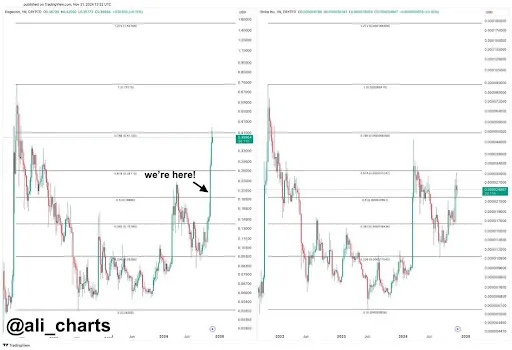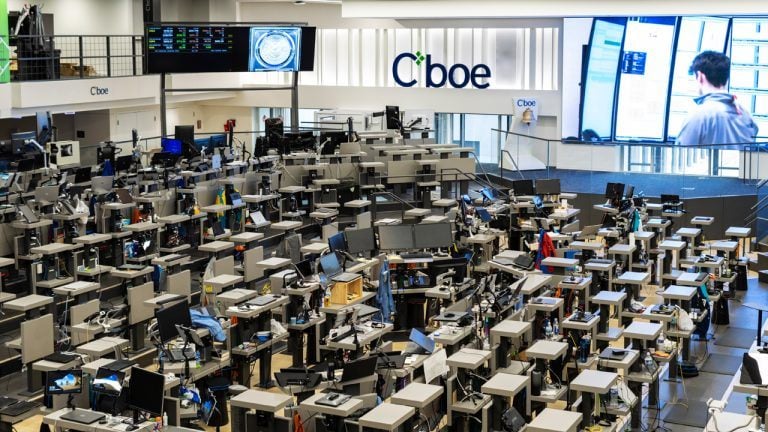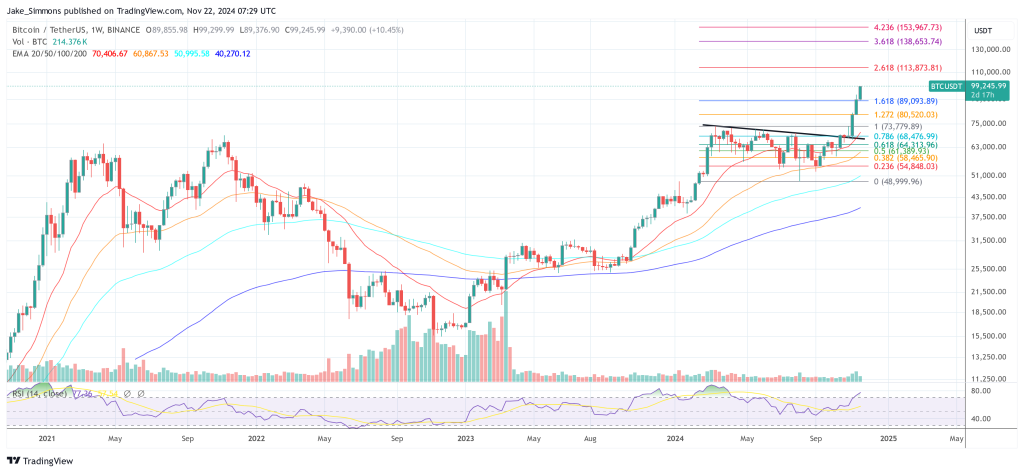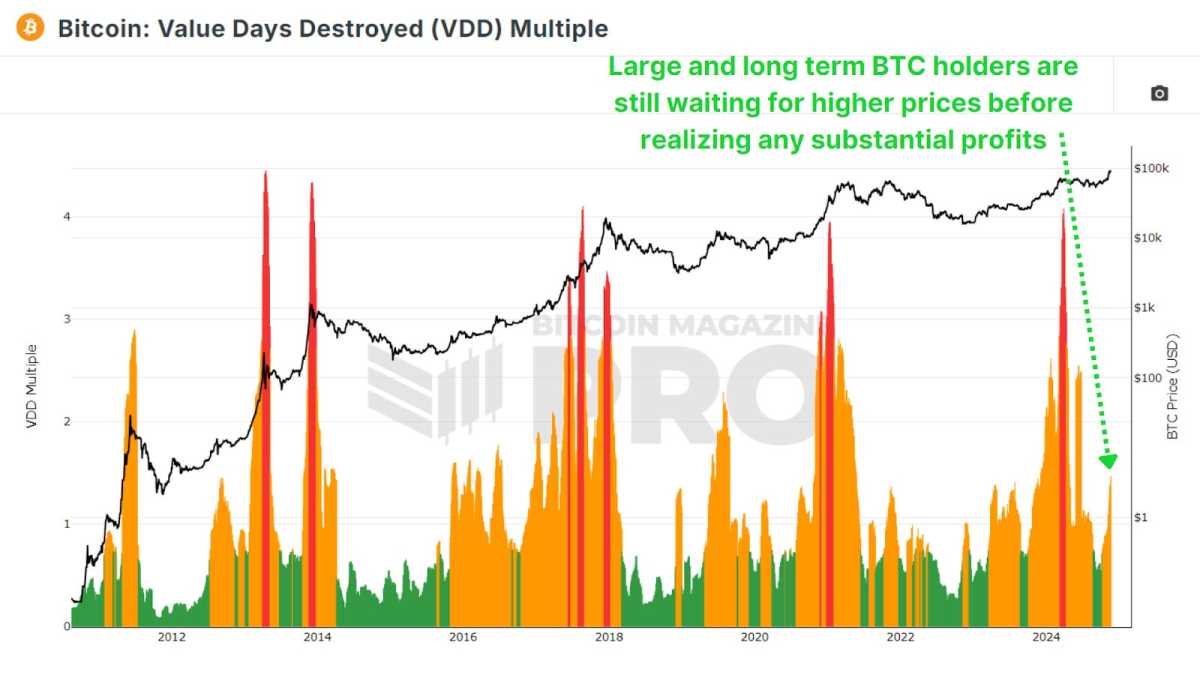Cryptocurrency aficionados and investors have been keenly following the moves of Bitcoin, the digital currency market's pioneer and bellwether. Bitcoin is displaying symptoms of a potential bull run after seeing unprecedented price rises and subsequent falls over the years. We examine the main causes for the renewed interest in Bitcoin, as well as the variables that may contribute to another large price gain.
Adoption in Institutions
The increased institutional use of cryptocurrencies is one of the key drivers of Bitcoin's recent recovery. Institutional investors, such as hedge funds, asset managers, and publicly traded firms, have begun putting money into Bitcoin. The bitcoin market gains credibility and legitimacy as a result of this institutional involvement.
High-profile endorsements and investments from firms such as Tesla and Square have gotten a lot of attention in the media, helping to shift the perception of cryptocurrencies from speculative assets to real stores of value and investment options. Institutional participation frequently results in increased liquidity and stability in the bitcoin market, which might attract more investors.
Factors Affecting the Economy at Large
Global macroeconomic factors have played a critical role in driving Bitcoin interest. Uncertainty in traditional financial markets has encouraged investors to seek alternative assets for diversification and as a hedge against inflation, which has been exacerbated by the COVID-19 epidemic and accompanying economic stimulus measures.
Bitcoin, also known as "digital gold," is considered as a safe haven asset by certain investors, analogous to physical gold. Because Bitcoin has a fixed number of 21 million coins, it is resistant to inflationary pressures, this belief has gained popularity during times of economic crisis and currency devaluation.
Institutional Infrastructure Development
With the creation of institutional-grade infrastructure, the bitcoin ecosystem has evolved dramatically over the last few years. The addition of Bitcoin futures contracts on regulated exchanges such as the Chicago Mercantile Exchange (CME) has made it easier for institutional investors to obtain exposure to Bitcoin while remaining compliant with regulatory regulations.
In addition to futures contracts, the emergence of cryptocurrency custodial services, over-the-counter (OTC) trading desks, and cryptocurrency-focused investment funds has made institutional entry into the market more convenient and secure. These advances have lowered the entry hurdles for large investors, contributing to the overall expansion of the cryptocurrency sector.
Scarcity and Event Halving
The scarcity of Bitcoin is a key driver of its value. Bitcoin is supposed to be deflationary, with a maximum supply of 21 million coins. This scarcity is exacerbated by Bitcoin halving occurrences, which occur about every four years. During a halving event, the rewards for validating transactions are cut in half, lowering the rate at which new Bitcoins enter the market.
Bitcoin halving events have often accompanied large price gains. The slowing of new supply, along with rising demand, causes a supply-demand mismatch that can drive up prices. The most recent Bitcoin halving occurred in May 2020, and the market is currently feeling the effects of its effects on supply dynamics.
Acceptance and Awareness in the Mainstream
Bitcoin and cryptocurrencies in general have garnered considerable acceptance and recognition in the mainstream. Cryptocurrency developments are constantly covered by major financial news sites, and significant players in the financial and technology industries freely discuss and invest in cryptocurrencies.
This enhanced visibility and awareness benefits retail investor participation. As more individuals become interested in cryptocurrencies, a natural flood of new investors occurs, which can fuel demand and contribute to price momentum upward.
Technological Advances
The blockchain, the underlying technology of Bitcoin, is constantly evolving and improving. Increased scalability, security, and efficiency have resulted from technological advancements in the bitcoin field. Layer 2 alternatives, like as the Lightning Network, seek to overcome Bitcoin's scaling issues by enabling faster and less expensive transactions.
Security improvements, such as hardware wallets and multi-signature authentication, have made Bitcoin a more secure asset for investors. These technological improvements boost confidence in Bitcoin's long-term viability and appeal as a digital asset.
Clarity in Regulation
While regulatory ambiguity has been a source of concern in the cryptocurrency industry, there have been some encouraging developments in terms of regulatory clarity in a number of places. Some countries have enacted explicit legislation controlling the usage and trading of cryptocurrencies, providing businesses and investors with a stable legal framework.
This regulatory clarity may entice institutional investors who need clear standards to meet legal and compliance needs. It also encourages the growth of cryptocurrency-related businesses and services, which helps to legitimize the market.
Ecosystem of Decentralized Finance (DeFi)
The rise of decentralized finance (DeFi) has fueled interest in cryptocurrencies, particularly Bitcoin. Users of DeFi platforms can earn interest, lend, borrow, and trade digital assets without the use of traditional financial intermediaries.
Many DeFi applications are developed on Bitcoin-compatible blockchain systems, allowing users to use Bitcoin as collateral for a variety of financial services inside the DeFi ecosystem. The incorporation of Bitcoin into DeFi enhances its utility beyond that of a store of value and presents it as an asset capable of generating passive income.
Bitcoin Surges Beyond $27,000 Ahead of Fed Meeting: What's Behind the Cryptocurrency Rally?
As reported by Cointelegraph, cryptocurrency markets saw a broad rally on Monday, with Bitcoin surging above $27,000, marking its first such rise this month.
The precise reason for this market movement remained unclear. However, there was a noticeable spike in trading volume during the Asian market's opening hours.
This surge in volume came following a report by Japan's Nikkei, suggesting that the Japanese government intends to permit startups to offer digital tokens to venture capital funds, in addition to traditional assets like shares and stock options.
Conclusion
A number of factors are driving the resurgence of interest in Bitcoin and the potential for another bull run, including institutional adoption, macroeconomic conditions, growing institutional infrastructure, Bitcoin's scarcity, mainstream acceptance, technological advancements, regulatory clarity, and the expanding DeFi ecosystem. These elements have contributed to a favorable climate for Bitcoin as an investment asset as well as a store of value.
However, keep in mind that the cryptocurrency market is highly volatile, and prices can move dramatically in a short period of time. Before entering the cryptocurrency market, investors should perform extensive research, analyze their risk tolerance, and examine their long-term investing objectives. While these elements enhance Bitcoin's potential for another bull run, it is still vulnerable to market dynamics and investor sentiment.
This article was written by Pedro Ferreira at www.financemagnates.com.
You can get bonuses upto $100 FREE BONUS when you:
💰 Install these recommended apps:
💲 SocialGood - 100% Crypto Back on Everyday Shopping
💲 xPortal - The DeFi For The Next Billion
💲 CryptoTab Browser - Lightweight, fast, and ready to mine!
💰 Register on these recommended exchanges:
🟡 Binance🟡 Bitfinex🟡 Bitmart🟡 Bittrex🟡 Bitget
🟡 CoinEx🟡 Crypto.com🟡 Gate.io🟡 Huobi🟡 Kucoin.



















Comments